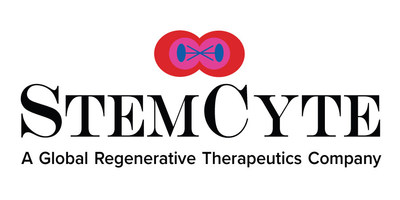Southern California cord blood therapeutics company StemCyte Inc. is announcing successful preliminary results for Phase I of the company’s clinical trial for treating acute cerebral stroke using monocytes from allogeneic human umbilical cord blood (hUCB).
|
BALDWIN PARK, Calif., Jan. 26, 2022 /PRNewswire/ -- Southern California cord blood therapeutics company StemCyte Inc. is announcing successful preliminary results for Phase I of the company's clinical trial for treating acute cerebral stroke using monocytes from allogeneic human umbilical cord blood (hUCB). The findings of the Phase I study were published in Cell Transplantation (CLL) in December 2021. "This outcome is as outstanding as it was unexpected." Jonas Wang, StemCyte Chairman & President
A Phase I study was conducted on patients aged 45-80 years who sustained acute ischemic stroke. Umbilical cord blood was obtained from StemCyte's public cord blood inventory based on ABO/Rh blood type, a Human Leukocyte Antigen (HLA) match of > 4/6, and a cell dose of total mononuclear cell (MNC) count of 0.5-5 x 107 cells/kg. Additionally, four (4) 100 mL doses of mannitol were administered intravenously 30 minutes following umbilical cord blood transplantation and every 4 hours thereafter. Primary outcomes were the number of patients who developed graft versus host disease (GVHD) within 100 days after transfusion. Secondary outcomes were changes in the National Institutes of Health Stroke Scale (NIHSS), Barthel index, and Berg Balance Scale scores. In one case, a 46-year-old male patient with a history of hypertension and hemodialysis for end-stage renal disease was treated allogeneically using hUCB with identical ABO/Rh, a 6/6 HLA match, and MNC count of 2.63 x 108 cells/kg. The patient did not present with serious adverse events or GVHD during the 12-month study. His NIHSS score decreased from 9 to 1; the Berg Balance Scale score increased from 0 to 48, and the Barthel index score increased from 0 to 90. This preliminary study showed that an adult patient with hemiplegia due to ischemic stroke completely recovered within 12 months after receiving allogeneic UCB therapy. "We are very pleased with the successful clinical outcome of StemCyte's Phase I study," said StemCyte President and Chairman Jonas Wang, PhD. "With acute stroke being the second and third leading cause of death and disability, respectively, worldwide, this outcome is as outstanding as it was unexpected." Approximately 30%-35% of people who suffer a stroke die and nearly 75% of survivors sustain permanent disability. Current treatments in the acute phase include the use of thrombolytic, anticoagulant, and antiplatelet agents. However, use of such agents increases the incidence of hemorrhage by 15%-20%. Cord blood stem cells proliferate into neural cells, and they were found to be effective in the treatment of several neurodegenerative diseases. In cerebral stroke, the intravenous injection of UCB and MNCs could restore exercise abilities as well as provide neuroprotective effects as indicated by decreased expression of inflammatory markers such as TNF-alpha, IL-1β and IL-2. StemCyte is a portfolio company of Microbio Group focusing on new drug discovery in cell therapy. It has operations in the United States, Taiwan, and India. The company has cooperated with more than 350 medical transplant centers around the world and has successfully assisted in the treatment of more than 2,200 patients using cord blood transplants. In its mission statement, the company is dedicated to helping the world's physicians save more lives by providing high quality, safe and effective stem cell products to all patients in need. Visit StemCyte.com to learn more. Contact: Research@StemCyte.com
SOURCE StemCyte |





